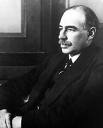John Maynard Keynes 1st Baron Keynes 1883 – 1946
February 25, 2010
 John Maynard
Keynes 1st Baron
Keynes,
CB
1883 – 1946 was a British economist whose ideas have been a central
influence on modern macroeconomics,
John Maynard
Keynes 1st Baron
Keynes,
CB
1883 – 1946 was a British economist whose ideas have been a central
influence on modern macroeconomics,
Maynard Keynes attended a small village primary school run by family neighbours W H F Johnson and his family, who were advocates of homeopathy and frequent visitors to the Keynes family home. Willy Johnson junior was a colleague of Maynard’s father, John Neville Keynes who would often spend evenings playing chess with W H F Johnson (Florence Ada Keynes, Gathering Up the Threads: A Study in Family Biography, (Heffer, 1950). Page 31).
Maynard Keynes wife, Lydia Lopokova had an affair with Igor Stravinsky, Lydia Lopokova was also a friend of Pablo Picasso, and Herbert George Wells. Maynard Keynes was a friend of Virginia Woolf,
Maynard Keynes’ grandfather Rev. John Brown was pastor of Bunyan’s Chapel in the town of Bedford, and a friend of Richard Cobden, William Hale White (whose father in law John Everard was a silk merchant and a friend and colleague of Jean Barthelemy Arles Dufour, as was Richard Cobden).
Maynard Keynes mother Florence Ada Keynes listened to Charles Haddon Spurgeon as a child, and she was a close friend of Caroline Lane Reynolds Slemmer Jebb, ’Aunt Cara’ to the children of Charles Darwin. Florence also knew Richard Monckton Milnes 1st Baron Houghton,
Maynard Keynes’ brother Geoffrey Keynes married Margaret Elizabeth Darwin, the daughter of George Howard Darwin and granddaughter of Charles Darwin,
From http://en.wikipedia.org/wiki/John_Maynard_Keynes John Maynard Keynes advocated interventionist government policy, by which governments would use fiscal and monetary measures to mitigate the adverse effects of business cycles, economic recessions, and depressions. His ideas are the basis for the school of thought known as Keynesian economics, and its various offshoots.In the 1930s, Keynes spearheaded a revolution in economic thinking, overturning the older ideas of neoclassical economics that held that free markets would automatically provide full employment as long as workers were flexible in their wage demands.
Following the outbreak of World War II, Keynes’s ideas concerning economic policy were adopted by leading Western economies. During the 1950s and 1960s, the success of Keynesian economics was so resounding that almost all capitalist governments adopted its policy recommendations.
In 1999, Time magazine included Keynes in their list of the 100 most important and influential people of the 20th century, commenting that; “His radical idea that governments should spend money they don’t have may have saved capitalism”.
Keynes’s influence waned in the 1970s, partly as a result of problems that began to afflict the Anglo-American economies from the start of the decade, and partly due to critiques from Milton Friedman and other economists who were pessimistic about the ability of governments to regulate the business cycle with fiscal policy.
However, the advent of the global financial crisis in 2007 has caused a resurgence in Keynesian thought. Keynesian economics has provided the theoretical underpinning for the plans of President Barack Obama of the United States, Prime Minister Gordon Brown of the United Kingdom, and other global leaders to ease the economic recession.
Keynes is widely considered the father of modern macroeconomics, and by various commentators such as economist John Sloman, the most influential economist of the 20th century. In addition to being an economist, Keynes was also a civil servant, a patron of the arts, a director of the Bank of England, an advisor to several charitable trusts, a writer, a private investor, an art collector, and a farmer.
Keynes was bisexual, openly acknowledging the homosexual relationships he had with other men. In 1925, he married the Russian ballerina Lydia Lopokova.
Of towering stature, Keynes stood at six foot, six inches.